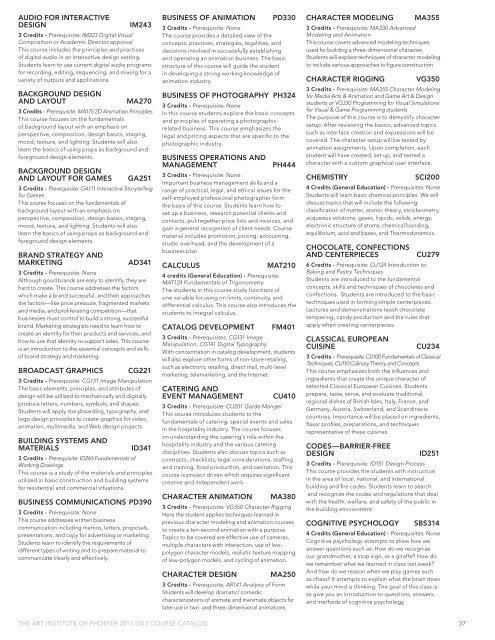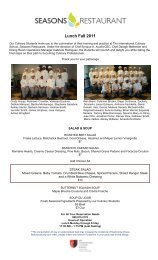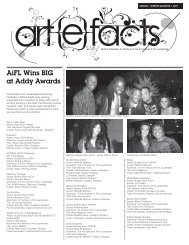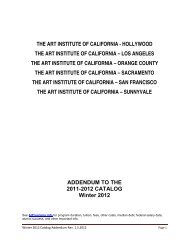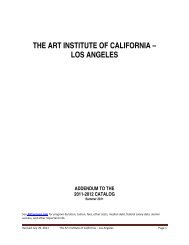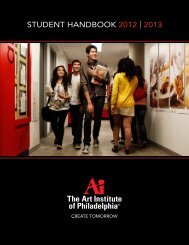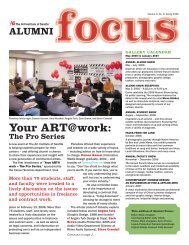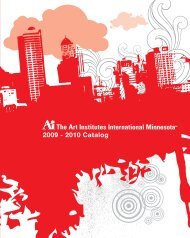2011-2013 CATALOG - The Art Institutes
2011-2013 CATALOG - The Art Institutes
2011-2013 CATALOG - The Art Institutes
You also want an ePaper? Increase the reach of your titles
YUMPU automatically turns print PDFs into web optimized ePapers that Google loves.
AUDIO FOR INTERACTIVE<br />
DESIGN IM243<br />
3 Credits - Prerequisite: IM223 Digital Visual<br />
Composition or Academic Director approval<br />
This course includes the principles and practices<br />
of digital audio in an interactive design setting.<br />
Students learn to use current digital audio programs<br />
for recording, editing, sequencing, and mixing for a<br />
variety of outputs and applications.<br />
BACKGROUND DESIGN<br />
AND LAYOUT MA270<br />
3 Credits - Prerequisite: MA175 2D Animation Principles<br />
This course focuses on the fundamentals<br />
of background layout with an emphasis on<br />
perspective, composition, design basics, staging,<br />
mood, texture, and lighting. Students will also<br />
learn the basics of using props as background and<br />
foreground design elements.<br />
BACKGROUND DESIGN<br />
AND LAYOUT FOR GAMES GA251<br />
3 Credits - Prerequisite: GA111 Interactive Storytelling<br />
for Games<br />
This course focuses on the fundamentals of<br />
background layout with an emphasis on<br />
perspective, composition, design basics, staging,<br />
mood, texture, and lighting. Students will also<br />
learn the basics of using props as background and<br />
foreground design elements.<br />
BRAND STRATEGY AND<br />
MARKETING AD341<br />
3 Credits - Prerequisite: None<br />
Although good brands are easy to identify, they are<br />
hard to create. This course addresses the factors<br />
which make a brand successful, and then approaches<br />
the factors—like price pressure, fragmented markets<br />
and media, and proliferating competition—that<br />
businesses must control to build a strong, successful<br />
brand. Marketing strategists need to learn how to<br />
create an identity for their products and services, and<br />
how to use that identity to support sales. This course<br />
is an introduction to the essential concepts and skills<br />
of brand strategy and marketing.<br />
BROADCAST GRAPHICS CG221<br />
3 Credits - Prerequisite: CG131 Image Manipulation<br />
<strong>The</strong> basic elements, principles, and attributes of<br />
design will be utilized to mechanically and digitally<br />
produce letters, numbers, symbols, and shapes.<br />
Students will apply storyboarding, typography, and<br />
logo design principles to create graphics for video,<br />
animation, multimedia, and Web design projects.<br />
BUILDING SYSTEMS AND<br />
MATERIALS ID341<br />
3 Credits - Prerequisite: ID265 Fundamentals of<br />
Working Drawings<br />
This course is a study of the materials and principles<br />
utilized in basic construction and building systems<br />
for residential and commercial situations.<br />
BUSINESS COMMUNICATIONS PD390<br />
3 Credits - Prerequisite: None<br />
This course addresses written business<br />
communication including memos, letters, proposals,<br />
presentations, and copy for advertising or marketing.<br />
Students learn to identify the requirements of<br />
different types of writing and to prepare material to<br />
communicate clearly and effectively.<br />
BUSINESS OF ANIMATION PD330<br />
3 Credits - Prerequisite: None<br />
<strong>The</strong> course provides a detailed view of the<br />
concepts, practices, strategies, legalities, and<br />
decisions involved in successfully establishing<br />
and operating an animation business. <strong>The</strong> basic<br />
structure of this course will guide the student<br />
in developing a strong working knowledge of<br />
animation industry.<br />
BUSINESS OF PHOTOGRAPHY PH324<br />
3 Credits - Prerequisite: None<br />
In this course students explore the basic concepts<br />
and principles of operating a photographicrelated<br />
business. This course emphasizes the<br />
legal and pricing aspects that are specific to the<br />
photographic industry.<br />
BUSINESS OPERATIONS AND<br />
MANAGEMENT PH444<br />
3 Credits - Prerequisite: None<br />
Important business management skills and a<br />
range of practical, legal, and ethical issues for the<br />
self-employed professional photographer form<br />
the basis of this course. Students learn how to<br />
set up a business, research potential clients and<br />
contacts, put together price lists and invoices, and<br />
gain a general recognition of client needs. Course<br />
material includes promotion, pricing, accounting,<br />
studio overhead, and the development of a<br />
business plan.<br />
CALCULUS MAT210<br />
4 credits (General Education) - Prerequisite:<br />
MAT124 Fundamentals of Trigonometry<br />
<strong>The</strong> students in this course study functions of<br />
one variable focusing on limits, continuity, and<br />
differential calculus. This course also introduces the<br />
students to integral calculus.<br />
<strong>CATALOG</strong> DEVELOPMENT FM401<br />
3 Credits - Prerequisites: CG131 Image<br />
Manipulation, CG141 Digital Typography<br />
With concentration in catalog development, students<br />
will also explore other forms of non-store retailing,<br />
such as electronic retailing, direct mail, multi-level<br />
marketing, telemarketing, and the Internet.<br />
CATERING AND<br />
EVENT MANAGEMENT CU410<br />
3 Credits - Prerequisite: CU201 Garde Manger<br />
This course introduces students to the<br />
fundamentals of catering, special events and sales<br />
in the hospitality industry. <strong>The</strong> course focuses<br />
on understanding the catering’s role within the<br />
hospitality industry and the various catering<br />
disciplines. Students also discuss topics such as<br />
contracts, checklists, legal considerations, staffing<br />
and training, food production, and sanitation. This<br />
course is project driven which requires significant<br />
creative and independent work.<br />
CHARACTER ANIMATION MA380<br />
3 Credits - Prerequisite: VG350 Character Rigging<br />
Here the student applies techniques learned in<br />
previous character modeling and animation courses<br />
to create a ten-second animation with a purpose.<br />
Topics to be covered are effective use of cameras,<br />
multiple characters with interaction, use of lowpolygon<br />
character models, realistic texture mapping<br />
of low-polygon models, and cycling of animation.<br />
CHARACTER DESIGN MA250<br />
3 Credits - Prerequisite: AR141 Analysis of Form<br />
Students will develop dramatic/ comedic<br />
characterizations of animate and inanimate objects for<br />
later use in two- and three-dimensional animations.<br />
CHARACTER MODELING MA355<br />
3 Credits - Prerequisite: MA330 Advanced<br />
Modeling and Animation<br />
This course covers advanced modeling techniques<br />
used for building a three-dimensional character.<br />
Students will explore techniques of character modeling<br />
to include various approaches to figure construction.<br />
CHARACTER RIGGING VG350<br />
3 Credits - Prerequisite: MA355 Character Modeling<br />
for Media <strong>Art</strong>s & Animation and Game <strong>Art</strong> & Design<br />
students or VG330 Programming for Visual Simulations<br />
for Visual & Game Programming students<br />
<strong>The</strong> purpose of this course is to demystify character<br />
setup. After reviewing the basics, advanced topics<br />
such as interface creation and expressions will be<br />
covered. <strong>The</strong> character setup will be tested by<br />
animation assignments. Upon completion, each<br />
student will have created, set up, and tested a<br />
character with a custom graphical user interface.<br />
CHEMISTRY SCI200<br />
4 Credits (General Education) - Prerequisites: None<br />
Students will learn basic chemical principles. We will<br />
discuss topics that will include the following:<br />
classification of matter, atomic theory, stoichiometry,<br />
acqueous solutions, gases, liquids, solids, energy,<br />
electronic structure of atoms, chemical bonding,<br />
equilibrium, acid and bases, and <strong>The</strong>rmodynamics.<br />
CHOCOLATE, CONFECTIONS<br />
AND CENTERPIECES CU279<br />
6 Credits - Prerequisite: CU124 Introduction to<br />
Baking and Pastry Techniques<br />
Students are introduced to the fundamental<br />
concepts, skills and techniques of chocolates and<br />
confections. Students are introduced to the basic<br />
techniques used in forming simple centerpieces.<br />
Lectures and demonstrations teach chocolate<br />
tempering, candy production and the rules that<br />
apply when creating centerpieces.<br />
CLASSICAL EUROPEAN<br />
CUISINE CU234<br />
3 Credits - Prerequisite: CU100 Fundamentals of Classical<br />
Techniques, CU110 Culinary <strong>The</strong>ory and Concepts<br />
This course emphasizes both the influences and<br />
ingredients that create the unique character of<br />
selected Classical European Cuisines. Students<br />
prepare, taste, serve, and evaluate traditional,<br />
regional dishes of British Isles, Italy, France, and<br />
Germany, Austria, Switzerland, and Scandinavia<br />
countries. Importance will be placed on ingredients,<br />
flavor profiles, preparations, and techniques<br />
representative of these cuisines.<br />
CODES—BARRIER-FREE<br />
DESIGN ID251<br />
3 Credits - Prerequisite: ID151 Design Process<br />
This course provides the students with instruction<br />
in the area of local, national, and international<br />
building and fire codes. Students learn to search<br />
and recognize the codes and regulations that deal<br />
with the health, welfare, and safety of the public in<br />
the building environment.<br />
COGNITIVE PSYCHOLOGY SBS314<br />
4 Credits (General Education) - Prerequisites: None<br />
Cognitive psychology attempts to show how we<br />
answer questions such as: How do we recognize<br />
our grandmother, a stop sign, or a giraffe? How do<br />
we remember what we learned in class last week?<br />
And how do we reason when we play games such<br />
as chess? It attempts to explain what the brain does<br />
while your mind is thinking. <strong>The</strong> goal of this class is<br />
to give you an introduction to questions, answers,<br />
and methods of cognitive psychology.<br />
THE ART INSTITUTE OF PHOENIX <strong>2011</strong>-<strong>2013</strong> COURSE <strong>CATALOG</strong> 37


